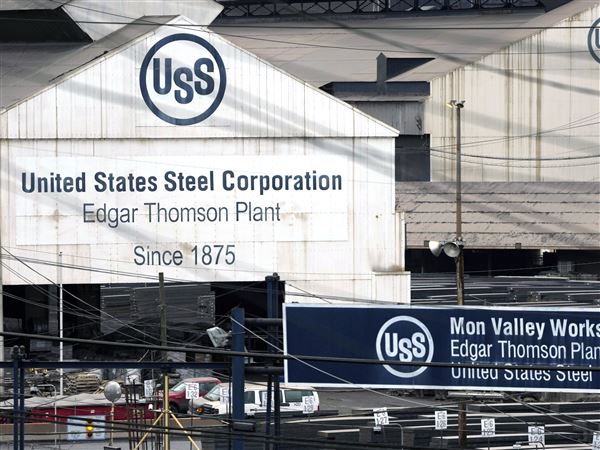Bob Long gave it an honest shot. He organized rallies, wrote to shareholders, and finally scored a meeting with the management of Consol Energy Inc. in an effort to get the company to reinstate healthcare benefits to retired miners.
It didn’t work, in part, Mr. Long thinks, because not enough people shared his outrage.
His group, Consol Retirees United, protested outside Penguin playoff games when the hockey arena was still called Consol Energy Center. Mr. Long compiled a list of stories from retirees who felt their loyalty to the company had been betrayed, and he published the tales on the group’s website beneath the image of coal-smeared miner and his hard hat.
When he chartered buses to bring 250 company retirees to a demonstration outside Consol’s Cecil headquarters in April 2015, only about 60 showed up.
He was dumbfounded by the lack of interest. “There were some people that were eager to do something about it but you could never get a large group together to make a difference,” he said.
“They were just apathetic, (saying) ‘Oh well, it happens to everybody, what are you going to do?'"
In 2014, after Consol sold five West Virginia coal mines to Murray Energy Corp, the Ohio-based company notified former employees of those mines that the healthcare benefits they thought would be theirs for life were being phased out. Some 1,200 former miners received the notice.
With competition from cheap natural gas and environmental regulations straining finances, it was, and still is, a tenuous time for coal companies — many of which shed their post-retirement obligations through bankruptcy or other reorganization plans. Consol, in shifting its focus to oil and gas development, has shed all but one of its mine complexes over the past several years.
When Murray Energy said it would stop providing healthcare benefits to Consol retirees, Consol put out a statement saying it wasn’t expecting this.
Murray doesn’t provide post-retirement benefits to any of its employees, the company said, and continuing coverage past a year for Consol retirees wasn’t a stipulation of the deal.
“While we respect the fact that Murray Energy is a different company with different priorities, this is an unfortunate and disappointing decision,” Consol said at the time.
Mr. Long wasn’t buying it. Murray Energy never promised him anything. It was Consol’s mantra that its miners would be set for life, he said. He took his fight to Consol and for a while he thought the public pressure campaign was working.
“We are committed to getting Consol to fix their broken promise,” he wrote in a Facebook post of the group’s page in May 2015, celebrating the “big win” of getting a meeting with Consol’s management.
Prior to the meeting, he sent the company a letter stating his wish that all Consol retirees — those from mines that remained under the company’s control and those sold to Murray — would be treated the same.
A week after Mr. Long’s meeting with the company, he received a call.
“They said, ‘Bob, we wanted you to be the first to know that all other retirees have had their healthcare benefits terminated,’” he recalled.
After that, Mr. Long said, he went from leading an apathetic movement to a nonexistent one. Even though the number of Consol retirees facing the end of their healthcare benefits went from about 1,200 to close to 6,000, the increase didn’t come with a corresponding call to arms.
Mr. Long didn’t understand why more retirees weren’t incredulous that as post-retirement benefits went by the wayside during a difficult economy, Consol’s CEO pay topped $8 million in 2014. Last year, it was around $7.8 million.
He said he needed the public show of force to put pressure on the company because he had found no viable legal options.
Concerned retirees had consulted lawyers in three states and all, he said, concluded the same thing: that the fine print on the benefit plan warned that the company could change or cancel it at any time.
“That’s the statement that clears them,” Mr. Long said. “Everybody got that when they were hired.”
Taking the fight to court
Meanwhile, a group of retirees in West Virginia hatched a legal strategy to get around the written disclaimer. Earlier this month, the group filed a lawsuit against Consol on behalf of more than 2,000 retirees.
The lawsuit — filed by two retirees of the Fola Coal operation in central West Virginia, which Consol sold earlier this year — implies that while Consol’s benefit plan for active employees did include a provision allowing the company to change or cancel it at will, miners were led to believe that once they retired, their benefits would “vest” and no longer be subject to that provision.
The document states that former employees didn’t receive a copy of the post-retirement plan until after they retired, so they couldn’t have known that what they were told orally was contradicted on paper.
Plaintiffs Benny Fitzwater and Clarence Bright said in the lawsuit filed in the U.S. District Court for the Southern District of West Virginia that the promise of lifetime benefits was ubiquitous but became acute during union organizing drives. The talking point was used to dissuade workers from organizing, they allege.
During one unionization effort in 2010, the president of operations at Fola and several human resource officers named in the complaint assured the miners that the healthcare benefits they were receiving at the time would “vest upon retirement” and continue until death, the document states.
“Don’t worry. You’ll have insurance for life,” Consol’s manager of human resources told Mr. Fitzwater, according to the lawsuit. That promise made the package offered to him “better than the union,” Mr. Fitzwater was told.
Consol declined to comment, citing pending litigation.
Clarence Bright also did not wish to talk to the Post-Gazette and Benny Fitzwater could not be reached.
Abraham Lincoln Neal, a 62-year-old retired miner from Fayette County, W.Va., is not named in the lawsuit but is a member of the group it purports to represent. He hopes that if the effort succeeds, he would benefit from it.
Mr. Neal had done “a little bit of everything” at Consol during his 24 years with the company, from underground work to outside dispatch, which was his last position when he retired in 2013 at the age of 59.
He said he had no idea that discontinuing healthcare was an option. “They acted like we could pay the premium and we’d always have insurance for the rest of our lives,” he said.
He said he heard it from human resources and mine presidents, over and over, especially when unions would come around and try to organize mine workers.
“I would have gone to work in the union mines and tried to get different type of pension,” he said, if he had known that his benefits weren’t a sure thing.
Mr. Long who had heard rumblings about the West Virginia lawsuit but wasn’t part of the effort, said he understood why Consol sought to keep unions at bay.
“I don’t blame the previous management at all,” he said. “Having non-union mines was a huge benefit to them. These were the most productive mines in the world. Nobody beat us.
“But the unfortunate thing here was they promised a lot of people early retirement at 55.”
That meant those who retired early and had their benefits canceled would have to find other insurance until they reached the eligible age for Medicare, 65. That’s what happened to him, Mr. Neal said.
A culture of loyalty
Mr. Long of McMurray spent 35 years at Consol, following his father and grandfather into the coal business. He said when he was underground, he tried to make the company successful, in part so that his father would continue to receive post-retirement benefits.
There was a culture of loyalty to the company and a sense of pride that workers didn’t need a union to get good treatment and care. It was a time, he said, when it wasn’t naive to think that just because there was a legal disclaimer in a document, it didn’t mean as much as a supervisor looking you in the eye and telling you your family would be taken care of for life.
“This is what you were told. This is what you were promised. Your wife was brought in when you were hired. You went through three days of orientation to lure you into a non-union job,” Mr. Long said.
After he read the lawsuit filed in West Virginia last week, Mr. Long said he felt like driving down there to meet the miners who think they’ve found the legal Achilles’ heel in Consol’s disclaimer, to see what they found that a handful of other lawyers couldn’t.
The lawsuit makes another charge that is novel to this effort — discrimination based on age and health history.
It says that when Consol ended post-retirement benefits for active employees, it gave them lump sum payments to compensate but it did not make a similar offer to retirees. According to the plaintiffs, that’s a violation of the Employee Retirement Income Security Act of 1974.
The lawsuit seeks a reinstatement of healthcare benefits and restitution for retirees to give them the same payout as was given to active employees last year.
While it purports to represent a class of about 2,000 non-union retired employees, the lawsuit speculates there might be as many as 12,000 that may have been impacted by Consol’s decision to end benefits.
Anya Litvak: alitvak@post-gazette.com or 412-263-1455.
First Published: October 27, 2016, 5:49 p.m.
















